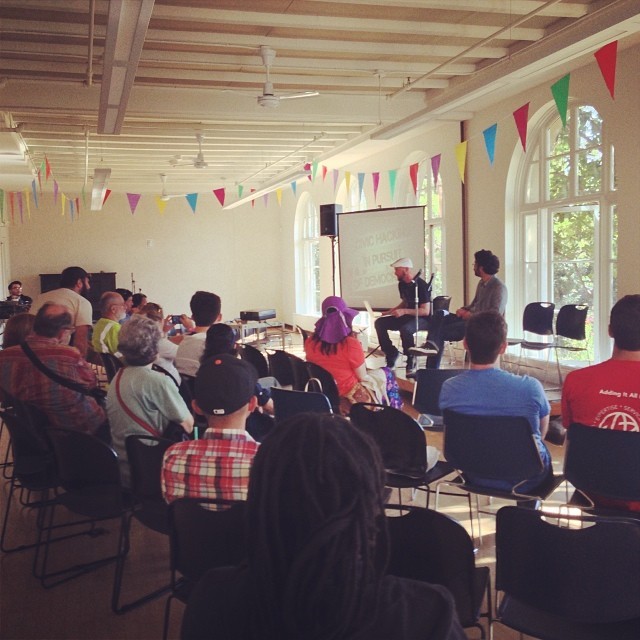Let’s dig into Mayor Walsh's open data executive order, Councilor Wu's proposed open data legislation, and consider what is possible for the future of open data (and open data policy) in Boston.
Continue readingMontgomery County’s Open Data Town Hall, the Town Hall of the Future
On Thursday November 21st, Montgomery County, Maryland hosted an Open Data Town Hall to solicit feedback from citizens about what data they would like to see prioritized for release online under Montgomery County’s open data law.
Continue readingOakland’s Public Participation Route to Open Data Legislation
 Steve Spiker and Eddie Tejeda (open data policy organizers) sharing OpenOakland’s work at East Bay Mini Maker Faire.
Oakland passed an open data law earlier this month (October 15, 2013) that was generated by the people and for the people. Open Oakland captain Steve Spiker (Spike) gathered the Open Oakland and broader open government community to draft and chat the best open data policy for Oakland. Spike and Open Oakland, in addition to garnering support for the open data policy, cultivated the policy from start to finish through drafting, public comments, a call to experts, and [teleconferenced] public meetings. Open Oakland serves as an excellent example of the community's role in generating open data policy, and their public input process is an exemplar route to incorporating public perspectives into policy. The Sunlight Foundation's Guideline to incorporating public perspective into policy implementation reads as follows:
Steve Spiker and Eddie Tejeda (open data policy organizers) sharing OpenOakland’s work at East Bay Mini Maker Faire.
Oakland passed an open data law earlier this month (October 15, 2013) that was generated by the people and for the people. Open Oakland captain Steve Spiker (Spike) gathered the Open Oakland and broader open government community to draft and chat the best open data policy for Oakland. Spike and Open Oakland, in addition to garnering support for the open data policy, cultivated the policy from start to finish through drafting, public comments, a call to experts, and [teleconferenced] public meetings. Open Oakland serves as an excellent example of the community's role in generating open data policy, and their public input process is an exemplar route to incorporating public perspectives into policy. The Sunlight Foundation's Guideline to incorporating public perspective into policy implementation reads as follows:
Implementing the details of an open data policy will benefit from public participation. Open data policies not only have effects government-wide, which will require consideration, but also have consequences for a variety of stakeholder groups outside of the government. Allowing these groups to participate in the decision-making process (and make real contributions) can have great benefits for policy creation and execution. Stakeholders and experts can bring to the table valuable new perspectives that highlight challenges or opportunities that might not otherwise be obvious. Formal mechanisms for collaboration can include hearings, draft proposals open for public comment and contribution, and online resources like wikis and email lists.Below we have outlined Oakland's public input process and how it is part of a growing trend to openly include community perspective, desires, and concerns into open data policy. Continue reading

